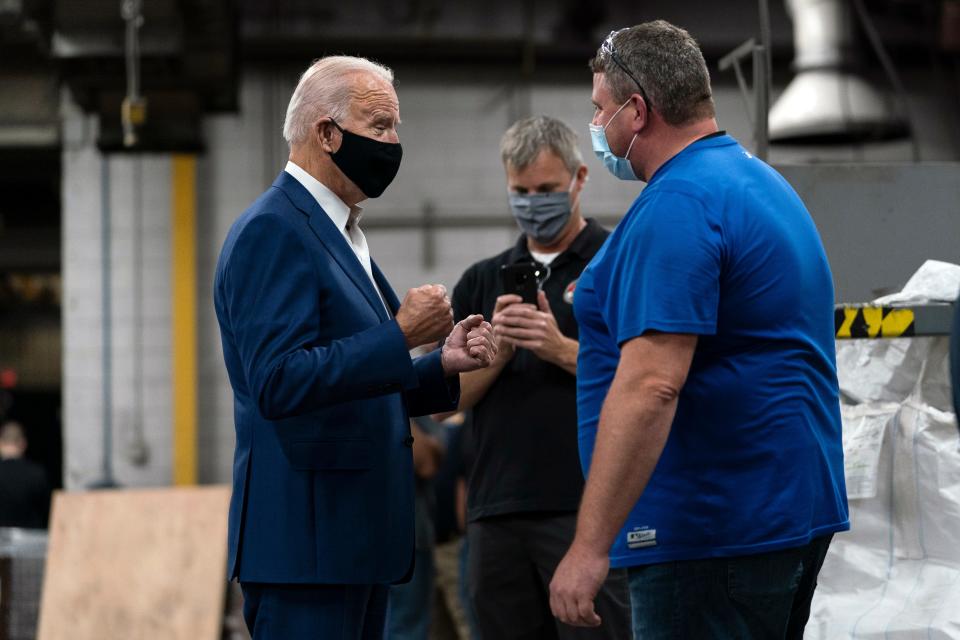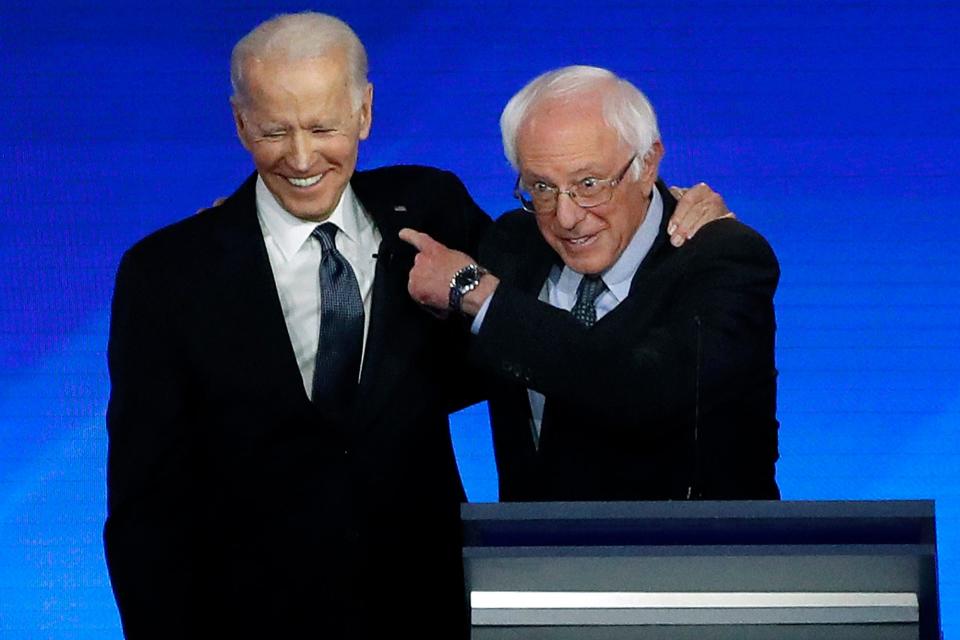'I beat the socialist': Biden tacks to the center in fight with Trump over Rust Belt moderates
WASHINGTON – Joe Biden rankled some progressives this month when he boasted of his primary victory over Sen. Bernie Sanders while responding to President Donald Trump's efforts to paint him as a left-wing radical.
"I beat the socialist," Biden said without mentioning Sanders by name during a campaign stop in Manitowoc, Wisconsin. "Do I look like a socialist? Look at my career. My whole career. I am not a socialist."
Former Democratic National Committee chair Donna Brazile scolded the Democratic presidential nominee on Twitter for a comment she said was "playing into Trump's divisive narrative."
"Play to your strengths," she advised Biden.
But Biden is betting that emphasizing centrist credentials will help him win over swing voters in Rust Belt states such as Wisconsin, Michigan and Pennsylvania, including some who backed Trump over Hillary Clinton in 2016.
Trump won all three states by whisker-thin margins: a combined 77,744 votes out of 13,940,912 cast, or about half a percentage point. Without Wisconsin, Michigan and Pennsylvania, Trump would have lost in the Electoral College.
Amy Coney Barrett: 10 ways Trump's pick could change the Supreme Court

Some of the white working-class and suburban voters who backed Trump four years ago had cast ballots for the ticket that Biden shared in 2008 and 2012 with Barack Obama.
In 2008, with the stock market collapsing at the height of the financial crisis, Obama won over suburban swing voters with a pledge to fix the economy and restore jobs. But some of those voters gravitated toward Trump in 2016 based on his pledge to get tougher on trade and fight for their economic interests.
For Biden, distancing himself from socialism could help him win over suburban voters who are wary of too much government interference in the economy.
At the same time, the former vice president is also channeling Sanders' populist economic rhetoric to try to slice into some of Trump's support with working-class voters.
His message: The wealthy real estate developer is no friend of blue-collar voters.
Scranton vs. Wall Street
“I’ve dealt with guys like Donald Trump my whole life – guys from the neighborhood where I come from who would look down on us because we didn’t have a lot of money or your parents didn’t go to college,” Biden said in a factory during his trip to Manitowoc, Wisconsin. “Guys who think they’re better than you."
Biden touted his working-class upbringing in Scranton, Pennsylvania, casting the 2020 presidential race as a contest between "Scranton and Wall Street." He argued that Trump's tax cuts benefited Wall Street and big corporations without lifting up the middle class. Biden has also accused Trump of botching the response to the coronavirus pandemic, saying that it cost lives while also exacerbating disruptions to the economy.
"Now some 30 million Americans are out of unemployment," Biden said, adding that Trump wants to give another "gigantic multimillion-dollar tax cut" to the very wealthy. "Whose hide does it come out of? It comes out of your hide.
"The simple truth is that Donald Trump ran for office saying he would represent the forgotten man and woman in this country. And then once he got in office, he forgot us. Not only did he forget them, the truth is that he never really respected us very much."
Biden went on to talk of graduating from a state school – the University of Delaware in 1965 – not an Ivy League college like recent presidents, including Trump.
"I say it's about time that a state school president sat in the Oval Office," Biden said.

Biden has maintained a lead over Trump in the three key Rust Belt battleground states, Pennsylvania, Michigan and Wisconsin. The FiveThirtyEight average of polls has Biden ahead by 5 percentage points in Pennsylvania, 7 points in Michigan and 6 points in Wisconsin. Trump has tried to make a play in another Midwest state – Minnesota – but polling there shows Biden ahead by an even greater margin.
For Clinton in 2016, the loss of white suburban voters wasn't the only reason for her defeat in Rust Belt states. A lack of enthusiasm among Black voters, who lean overwhelmingly Democratic, helped to account for her losses in Wisconsin, Michigan and Pennsylvania.
As Biden tries to put together a winning coalition for those key states, the first debate between Biden and Trump in Cleveland Tuesday will give the Democratic candidate another opportunity to push back on the president's efforts to cast him as a captive of the radical left.
First Trump-Biden debate: Supreme Court, coronavirus, race among the topics for the Cleveland debate
One risk for Biden is that the effort to distance himself from the socialist label and his emphasis on centrist themes will dampen enthusiasm among progressives, especially younger voters who embraced Sanders during the primary.
But Jeff Weaver, who served as Sanders' campaign manager during his 2016 presidential run, said anger at Trump was helping to unify different segments of the Democratic Party.
"Donald Trump is the P.T. Barnum of modern American politics and it's important to expose what is really at issue of this campaign, which is the future progress of working people in this country and marginalized communities," Weaver said.
Weaver said two issues will help drive progressive support for Biden in November: the hunger to beat "the most destructive president in modern American history" and Biden's support for issues such as raising the minimum wage, increasing family leave pay and dealing with climate change.
There's "100%" more enthusiasm around Biden among the left than Clinton four years ago, said Weaver, who founded the pro-Biden Super PAC America's Progressive Promise.
Sanders goes to bat for Biden
If Sanders was annoyed by Biden referring to him as "the socialist," he didn't show it during a speech Thursday at George Washington University not far from the White House.
The Vermont senator said he is "strongly supporting" Biden, though he focused much of his speech criticizing Trump's refusal to say, when asked by a reporter, whether he would commit to a peaceful transfer of power if he were to lose.
His remarks kicked off Sanders' new role in the campaign – not touting progressive causes like universal health care or the Green New Deal on behalf of Biden, but framing the race as a "struggle to preserve American democracy."
Four years ago, tens of thousands of Sanders voters – about 1 in 8 – pivoted from the Vermont senator during the presidential primary and cast a ballot in the general election for a real estate mogul who championed capitalist ideals.

They liked Trump’s call for a rebirth in American manufacturing, his willingness to confront unfair trade practices by other countries, his blunt takedown of Washington’s power structure – themes Sanders pounded as well.
More: Joe Biden endorsed, Trump excoriated by nearly 500 retired top military, national security officials
And they didn’t particularly care for Clinton.
A USA TODAY/Suffolk University survey in April, around the time Sanders ended his 2020 presidential bid, indicated Biden may lose fewer of the progressive icon's supporters than Clinton did.The survey of 638 voters who backed Sanders in primaries or caucuses this year found that 4% plan to vote for Trump – down from the 12% who voted for Trump over Clinton, according to a 2017 Cooperative Congressional Election study. The Suffolk poll had a margin of error of plus or minus 4 percentage points.
Charles Franklin, director of the Marquette Law School poll in Wisconsin, said Biden is doing a better job than Clinton did of keeping Democrats and left-leaning independents in the fold.
Franklin said Trump is "the great unifier for Democrats this year. A gift that keeps giving to the other party."
Riots. Radicalism. Corruption: Trump and Biden supporters turn to apocalyptic themes in campaign ad wars.
More: Trump declines to commit to peaceful transfer of power, McConnell promises 'orderly transition'
The Marquette polls showed that a greater percentage of Sanders voters (79%) in Wisconsin who identify as Democrats or left-leaning independents view Biden favorably in 2020 compared to Clinton (71%) in 2016, Franklin said.
Todd Belt, professor and political management program director at George Washington University, said he doesn't believe Biden risks alienating progressive voters by pushing back at the socialism tag. He said analyses suggest the Sanders' wing of the party is "pretty solidly" behind Biden
"They've made peace with the fact that he is the nominee and they don't intend to repeat a division of the party that happened in 2016," Belt said.
Contributing: Associated Press
This article originally appeared on USA TODAY: Election 2020: Joe Biden tries to cut into Trump's Rust Belt support
